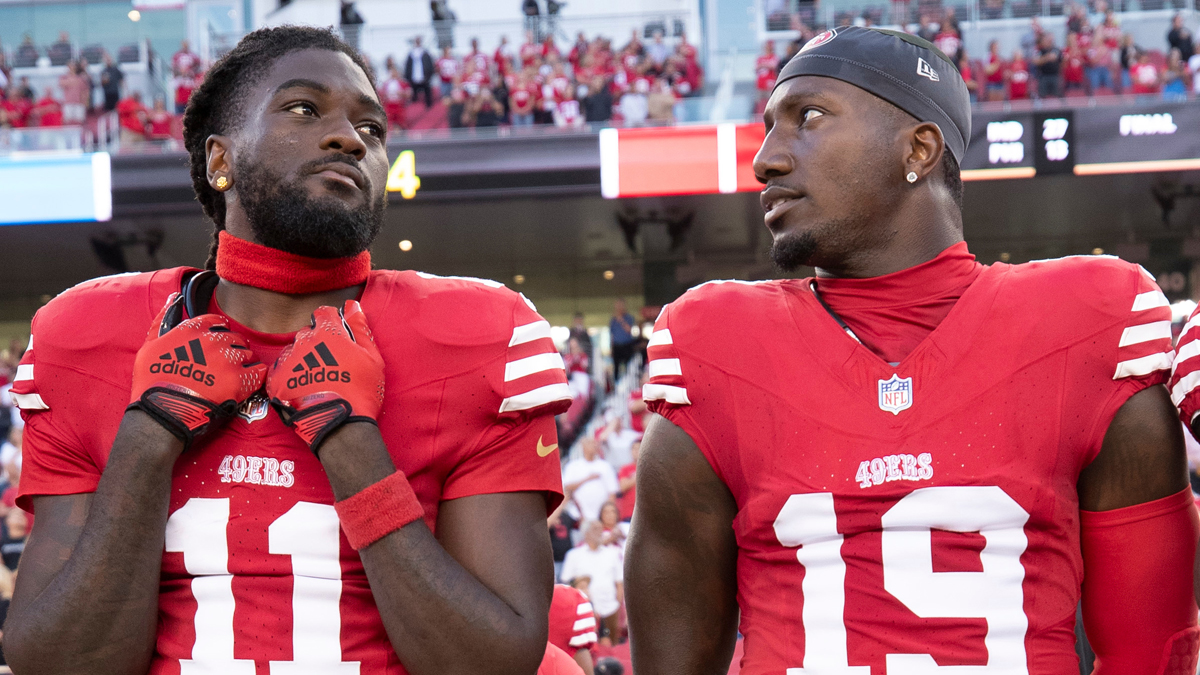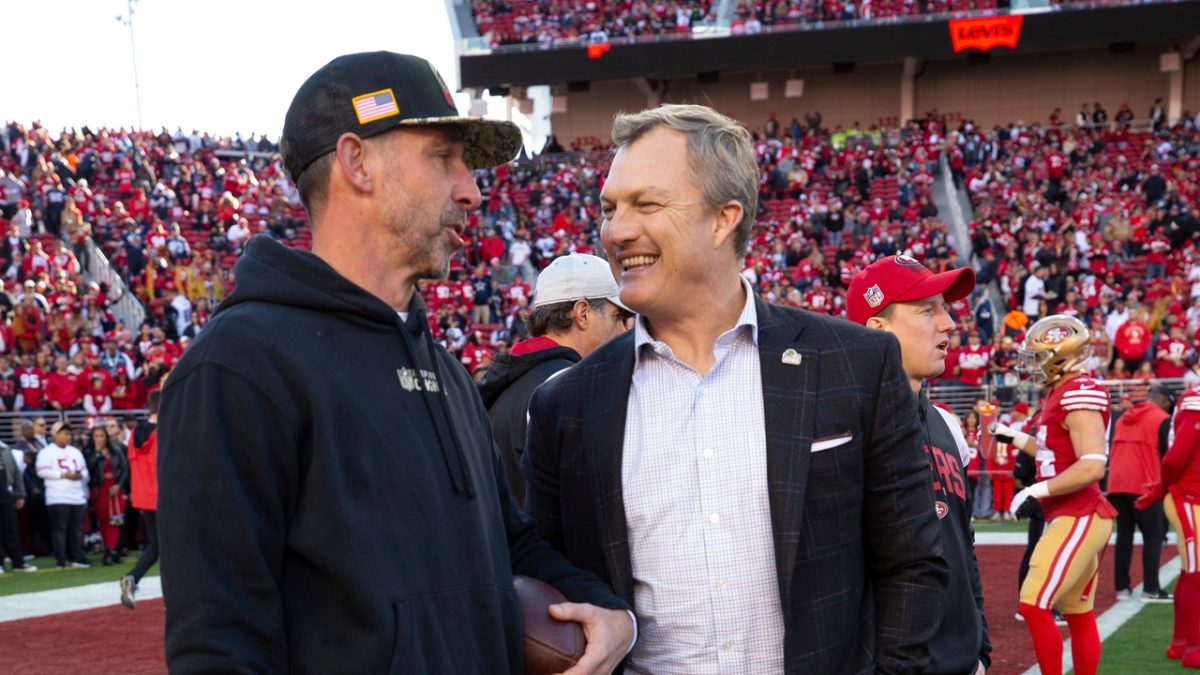If you logged onto Twitter Wednesday morning you might have been perplexed as to why former 49ers coach Jim Harbaugh was trending.
Then you saw the quote. Or at least a snippet of a long-winded answer Harbaugh gave when discussing whether or not college football should be played amid the coronavirus pandemic.
As usual, the Twitter outrage mob missed the mark. While Harbaugh's out-of-context quote seemed like an unsympathetic justification to put student-athletes in harm's way, what he actually offered was one of the more sensible takes on the potential for a college football season in the fall.
Stay in the game with the latest updates on your beloved Bay Area and California sports teams! Sign up here for our All Access Daily newsletter.
"Yeah, my personal thoughts would, it's a different conversation if there's no students on campus," Harbaugh said, via Orion Sang of the Detroit Free Press. "If students are on campus then it's my personal belief as a parent of a daughter who would also be on campus that this is a safe place. As safe as possible would be within our university, in our athletic buildings and complexes. That safety precautions that have been put into place. I would feel good with the medical oversight of the students, student-athletes. I would want the responsibility. I would want the responsibility of keeping our players safe and educating them. Would not want to come off the guard tower of educating them and keeping them safe. Now, if it comes to a point in time where you say we can't play, it's obvious, it's clear, then everybody would be reasonable and know that's the right thing to do.
"COVID is part of our society," Harbaugh continued. "Wasn't caused by football or caused by sports. And there's no expert view right now that I'm aware of that sports is going to make that worse. It's part of our society, we're going to have to deal with it. These kids are going to have to do the same thing. They've got to go to school. They've trained their whole lives for the opportunity to play their sport. That is my view with the knowledge that we have time to learn more about it. It would be my responsibility, our responsibility and the players' responsibility also, to keep themselves safe and get the training and schooling that they need."
Harbaugh's point is quite measured. Universities likely have more resources and infrastructure to keep students safe and healthy than they might be if they weren't on campus. Of course, a lot of that comes down to college students not doing things college students do, like go to parties and bars. LSU had to shut down its voluntary workouts after they had to place 30 players in quarantine after a number of them visited nightclubs that were linked to an outbreak.
Harbaugh said his players were committed to setting a good example for the rest of the student body and following guidelines.
San Francisco 49ers
"I'd say the big question I'm really getting from a lot of our players is how they can be part of a solution," Harbaugh said. "A lot of feedback has been that their peers, other people in their age group are somewhat cavalier about the virus. How it affects that age group. Their response has been they want to be part of the solution. They want to be a force for good, an example when there's here there's protocols that have been put in place. They've been terrific. They've been really great about following those. I think they really understand that there's great value to keeping their own personal health but also that of their teammates. They've taken it to the extra level when they are out in public to wear a mask, socially distance, cooking their own food, shopping. Everything they are doing, they are being a really great example and a force for good."
[49ERS INSIDER PODCAST: Listen to the latest episode]
However, Harbaugh's bit about sports not making it worse doesn't entirely hit the mark. Anthony Fauci, the director of the National Institute of Allergy and Infectious Diseases, outlined how the virus would spread while playing a close-quarter sport like football to NBC Sports' Peter King.
“This is a respiratory virus, so it’s going to be spread by shedding virus," Fauci told King. "The problem with virus shedding is that if I have it in my nasal pharynx, and it sheds and I wipe my hand against my nose—now it’s on my hand. You see, then I touch my chest or my thigh, then it’s on my chest or my thigh for at least a few hours. Sweat as such won’t transmit it. But if people are in such close contact as football players are on every single play, then that’s the perfect set up for spreading. I would think that if there is an infected football player on the field—a middle linebacker, a tackle, whoever it is it—as soon as they hit the next guy, the chances are that they will be shedding virus all over that person."
For Fauci, he'd test everyone before the game and make sure any carriers were sidelined.
“If you really want to be in a situation where you want to be absolutely certain, you’d test all the players before the game. And you say, Those who are infected: Sorry, you’re sidelined. Those who are free: Get in there and play.”
Of course, Harbaugh was saying that playing football without fans wouldn't lead to an outbreak, not that the players aren't susceptible to the virus. We know one of Italy's largest outbreaks was linked to a soccer game. Until there's a vaccine, playing with fans in the stadium seems out of the question. Harbaugh was saying his current belief, with the information available, is that football should be able to happen, without fans in the stadium if all the protocols and precautions are followed. That would allow them to minimize the potential cases.
Harbaugh's best point is one that Michigan President Mark S. Schlissel brought up in May. If there are no students on campus, then there will be no sports. If the university feels it is safe enough to have the student body back then sports can commence. But it would be foolish to send all students home but ask the student-athletes to come to campus and play.
[RELATED: Brady's coronavirus dismissal reason sports should stay paused]
There are a lot of moving parts and even more power brokers in college football, with no true governing body determining whether a season will take place. College football had time on its side when the virus outbreak began in March. That time is running out. Team camps should start late this month or in early August. The power five commissioners, university presidents and NCAA commissioner Mark Emmert must decide how a season will be conducted or if it can be done so safely. Will there be only conference games? Will it be a shortened season? Should they play in the spring?
Many questions still need to be answered before football can return. Harbaugh, like the rest of us, is just taking it day by day.


